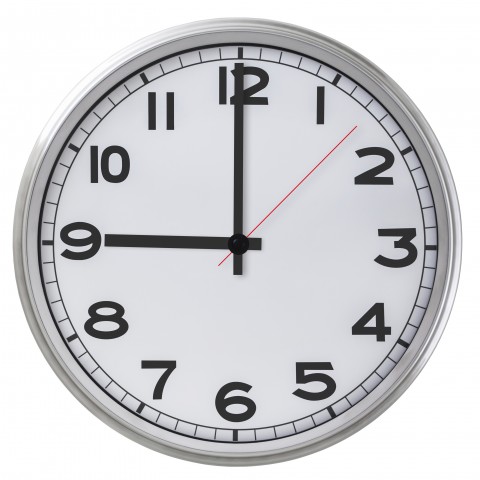
As a Chinese language-learner, one of the things you likely wonder about often is how to tell time in Chinese. Everything we do is seamlessly associated with time. We consume time every day and are always in a running competition with it. We care about time, and time has become one of the most important topics in our everyday lives. It’s important to stay on track with what you do, no matter where you are; further, you should do your best to be on time for certain events. This is why time in Chinese culture plays a big role.
“Time” in Chinese is 时间 (shí jiān). The rules for telling the time in Mandarin Chinese are all straightforward and simple to follow, so let go of your fears and proceed with confidence.
With ChineseClass101.com, learning time in Chinese is fun and effective at the same time!
 Table of Contents
Table of Contents
- How to Ask for the Time
- The Hours in Chinese
- The Minutes in Chinese
- Hours Divided into Minutes
- General Time References of the Day
- Chinese Time Adverbs
- Common Phrases Regarding Time
- Bonus: Proverbs and Sayings
- Conclusion
1. How to Ask for the Time
You need to always keep track of your own time.

- In Chinese: 现在几点了?
Pinyin: Xiàn zài jǐ diǎn le.
In English: What time is it?
- In Chinese: 请问你知道现在的时间吗?
Pinyin: Qǐng wèn nǐ zhī dào xiàn zài de shí jiān ma?
In English: Do you have the time, please?
- In Chinese: 请问[会议]是什么时候?
Pinyin: Qǐng wèn [huì yì] shì shí me shén hou?
In English: What time is the [meeting]?
Feel free to replace the event in the brackets with any other event.
2. The Hours in Chinese
Can you express the time in Chinese precisely?

In China, people are used to the twenty-four-hour clock. In order to master telling the time in Mandarin Chinese, let’s get to know these two important vocabulary words first:
- 小时 (xiǎo shí) — hour
- 点钟 (diǎn zhōng) — o’clock
As we mentioned above, “hour” in Chinese is 小时 (xiǎo shí), and 钟头 (zhōng tóu) is another way to say “hours” in daily conversation; it’s less formal than 小时 (xiǎo shí).
However, to make it more convenient for speech, we usually just say the simplified version of 点钟 (diǎn zhōng), which is 点 (diǎn).
Now, how do you say the time in Chinese exactly? Easy.
To express any hour, all you need to do is say the number first and add 点 (diǎn) / 点钟 (diǎn zhōng) right after. For example, four o’clock would be 四点 (sì diǎn) / 四点钟 (sì diǎn zhōng).
Here’s a list of time words in Chinese that will help you understand how the twenty-four-hour clock works:
- 一点钟 (yī diǎn zhōng) — 1 o’clock
- 两点钟 (liǎng diǎn zhōng) — 2 o’clock
- 三点钟 (sān diǎn zhōng) — 3 o’clock
- 四点钟 (sì diǎn zhōng) — 4 o’clock
- 五点钟 (wǔ diǎn zhōng) — 5 o’clock
- 六点钟 (liù diǎn zhōng) — 6 o’clock
- 七点钟 (qī diǎn zhōng) — 7 o’clock
- 八点钟 (bā diǎn zhōng) — 8 o’clock
- 九点钟 (jiǔ diǎn zhōng) — 9 o’clock
- 十点钟 (shí diǎn zhōng) — 10 o’clock
- 十一点钟 (shí yī diǎn zhōng) — 11 o’clock
- 十二点钟 (shí èr diǎn zhōng) — 12 o’clock
- 十三点钟 (shí sān diǎn zhōng) — 13 o’clock
- 十四点钟 (shí sì diǎn zhōng) — 14 o’clock
- 十五点钟 (shí wǔ diǎn zhōng) — 15 o’clock
- 十六点钟 (shí liù diǎn zhōng) — 16 o’clock
- 十七点钟 (shí qī diǎn zhōng) — 17 o’clock
- 十八点钟 (shí bā diǎn zhōng) — 18 o’clock
- 十九点钟 (shí jiǔ diǎn zhōng) — 19 o’clock
- 二十点钟 (èr shí diǎn zhōng) — 20 o’clock
- 二十一点钟 (èr shí yī diǎn zhōng) — 21 o’clock
- 二十二点钟 (èr shí èr diǎn zhōng) — 22 o’clock
- 二十三点钟 (èr shí sān diǎn zhōng) — 23 o’clock
- 二十四点钟 (èr shí sì diǎn zhōng) — 24 o’clock
- 零点 (líng diǎn) — 0 o’clock
Usage in a sentence:
In Chinese: 现在是16点钟。
Pinyin: Xiàn zài shì shí liù diǎn zhōng.
In English: It’s 4 PM.
Additional Notes:
Remember that when referring to time and currency, 两 (liǎng) is used for “two” instead of 二 (èr), which is used more commonly for counting.
3. The Minutes in Chinese

分钟 (fēn zhōng) is one of the most important time words in Chinese, meaning “minute.” Usually, people simplify it and just say 分 (fēn), which means the same thing. To express any specific minute at any hour, you just need to follow this formula: [number] “点 (diǎn) / 点钟 (diǎn zhōng)” + [number] “分 (fēn).”
Usage in a sentence:
In Chinese: 现在是三点十八分。
Pinyin: Xiàn zài shì sān diǎn shí bā fēn.
In English: It’s 3:18 right now.
4. Hours Divided into Minutes
点半 (diǎn bàn) – half
Structure:
In Chinese: 现在的时间是[点钟数字] 点 + 分钟
In English: It’s [number of the clock] o’clock + minutes
Usage in a sentence:
In Chinese: 现在的时间是三点半。
Pinyin: Xiàn zài de shí jiān shì sān diǎn bàn.
In English: It’s half past three now.
一刻 (yī kè) – quarter
Usage in a sentence:
In Chinese: 现在的时间是五点一刻。
Pinyin: Xiàn zài de shí jiān shì wǔ diǎn yī kè.
In English: It’s a quarter past five right now.
5. General Time References of the Day

What if you just want to give an approximate time in Chinese? Here are some words you can use to tell someone a general time of day.
- 早晨 (zǎo chén) — early morning
- 日出 (rì chū) — sunrise
- 下午 (xià wǔ) — afternoon
- 晚上 (wǎn shàng) — evening
- 中午 (zhōng wǔ) — noon
- 日落 (rì luò) — sunset
- 夜里 (yè lǐ) — at night
- 半夜 (bàn yè) — midnight
- 凌晨 (líng chén) — before dawn
Usage in a sentence:
In Chinese: 我喜欢在[下午]的时候吃水果。
Pinyin: Wǒ xǐ huan zài [xià wǔ] de shí hou chī shuǐ guǒ.
In English: I like to eat fruit in the afternoon.
Additional Notes:
Feel free to replace the example time reference in the brackets with any of the other time words in Chinese above. You can also check out our article regarding dates in Chinese here.
6. Chinese Time Adverbs
Remember to arrange your time wisely.

Time adverbs in Chinese can help you communicate with more-detailed and complete sentences. Here are the most common ones.
现在 (xiàn zài) – right now
Usage in a sentence:
In Chinese: 抱歉,我现在很忙,待会给你回电话。
Pinyin: Bào qiàn, wǒ xiàn zài hěn máng, dāi huì gěi nǐ huí diàn huà.
In English: Sorry, I am very busy right now. I will call you back in a bit.
目前 (mù qián) – currently
Usage in a sentence:
In Chinese: 我目前正在专心复习考试。
Pinyin: Wǒ mù qián zhèng zài zhuān xīn fù xí kǎo shì.
In English: Currently, I am focusing on reviewing the exam.
同时 (tóng shí) – meanwhile / at the same time
Usage in a sentence:
In Chinese: 我可以同时出色地完成很多件事。
Pinyin: Wǒ kě yǐ tóng shí chū sè de wán chéng hěn duō jiàn shì.
In English: I can multitask very well.
之前 (zhī qián) – before
Usage in a sentence:
In Chinese: 每次睡觉之前,我都喜欢阅读一会。
Pinyin: Měi cì shuì jiào zhī qián, wǒ dōu xǐ huan yuè dú yī huì.
In English: Every time before I go to sleep, I like to read for a little while.
之后 (zhī hòu) – after
Usage in a sentence:
In Chinese: 我习惯在吃饭之后喝一杯果汁。
Pinyin: Wǒ xí guàn zài chī fàn zhī hòu hē yī bēi guǒ zhī.
In English: I am used to drinking a cup of juice after a meal.
很快 (hěn kuài) – soon
Usage in a sentence:
In Chinese: 我很快就可以帮你辅导作业了。
Pinyin: Wǒ hěn kuài jiù kě yǐ bāng nǐ fǔ dǎo zuò yè le.
In English: I will be helping you with your homework soon.
立刻 (lì kè) – immediately
Usage in a sentence:
In Chinese: 每次收到短信,我都会立刻回复。
Pinyin: Měi cì shōu dào duǎn xìn, wǒ dōu huì lì kè huí fù.
In English: Every time I receive a message, I reply immediately.
差不多 (chà bu duō) – almost
Usage in a sentence:
In Chinese: 我差不多快到了。
Pinyin: Wǒ chà bu duō kuài dào le.
In English: I am almost there.
过一会儿 (guò yī huìr) – in a little while
Usage in a sentence:
In Chinese: 他过一会儿就会回来了。
Pinyin: Tā guò yī huìr jiù huì huí lái le.
In English: He will be back in a little while.
很久 (hěn jiǔ) – for a long time
Usage in a sentence:
In Chinese: 我们曾经做了很久的好朋友。
Pinyin: Wǒ men céng jīng zuò le hěn jiǔ de hǎo péng you.
In English: We were good friends for a long time.
任何时候 (rèn hé shí hou) – any time
Usage in a sentence:
In Chinese: 在任何时候,只要你需要我,我就会陪在你身边。
Pinyin: Zài rèn hé shí hou, zhī yào nǐ xū yào wǒ, wǒ jiù huì péi zài nǐ shēn biān.
In English: I will be with you at any time as long as you need me.
尽快 (jìn kuài) – as soon as possible
Usage in a sentence:
In Chinese: 我尽快把邮件发给你。
Pinyin: Wǒ jìn kuài bǎ yóu jiàn fā gěi nǐ.
In English: I will send you the email as soon as possible.
Additional Notes:
Usually, adverbs are added to the beginning of a sentence, after the subject.
7. Common Phrases Regarding Time
It can be tough to catch up with time sometimes!

时间 (shí jiān), which is “time” in Chinese, can be tight and precious, or hard to manage. Time in Chinese culture is always an important topic to discuss as our everyday arrangements depend on it. Sometimes we have to apologize for being late, and sometimes we just want to ask other people to be on time. Here are some of the most common phrases for talking about time in Chinese that will certainly help you communicate with others.
- In Chinese: 赶紧的!
Pinyin: Gǎn jǐn de!
In English: Hurry up!
- In Chinese: 抱歉,我迟到了。
Pinyin: Bào qiàn, wǒ chí dào le.
In English: Sorry that I’m late.
- In Chinese: 我现在就出发。
Pinyin: Wǒ xiàn zài jiù chū fā.
In English: I will be going right now.
- In Chinese: 以防堵车,我打算提前半小时出发。
Pinyin: Yǐ fáng dǔ chē, wǒ dǎ suàn tí qián bàn xiǎo shí chū fā.
In English: Just in case there’s traffic, I plan to leave thirty minutes early.
- In Chinese: 请提前到达集合地点。
Pinyin: Qǐng tí qián dào dá jí hé dì diǎn.
In English: Please arrive early at the meeting place.
- In Chinese: 请准时到。
Pinyin: Qǐng zhǔn shí dào.
In English: Please be on time.
8. Bonus: Proverbs and Sayings
We should always cherish the time no matter what.

Here are some proverbs and idioms about time in Chinese that will help you sound like a native speaker.
- In Chinese: 时间就是金钱。
Pinyin: Shí jiān jiù shì jīn qián.
In English: Time is money.
- In Chinese: 一寸光阴一寸金,寸金难买寸光阴。
Pinyin: Yī cùn guāng yīn yī cùn jīn, cùn jīn nán mǎi cùn guāng yīn.
In English: An inch of gold will not buy an inch of time, and you can’t buy an inch of time with an inch of gold.
- In Chinese: 时间会治愈一切。
Pinyin: Shí jiān huì zhì yù yī qiē.
In English: Time heals all wounds.
- In Chinese: 时光飞逝。
Pinyin: Shí guāng fēi shì.
In English: Time flies.
9. Conclusion

Now, I hope you’ve mastered the art of how to tell time in Chinese. If you’re a Chinese language-learner who’s full of curiosity and a desire to learn more, then our online lessons will be just perfect for a diligent individual like you. Visit ChineseClass101.com today to acquire a once-in-your-lifetime Chinese learning experience!
Before you go, let us know in the comments how you feel about telling the time in Chinese now. To practice, tell us what time it is where you are, in Chinese! 🙂 We look forward to hearing from you.










